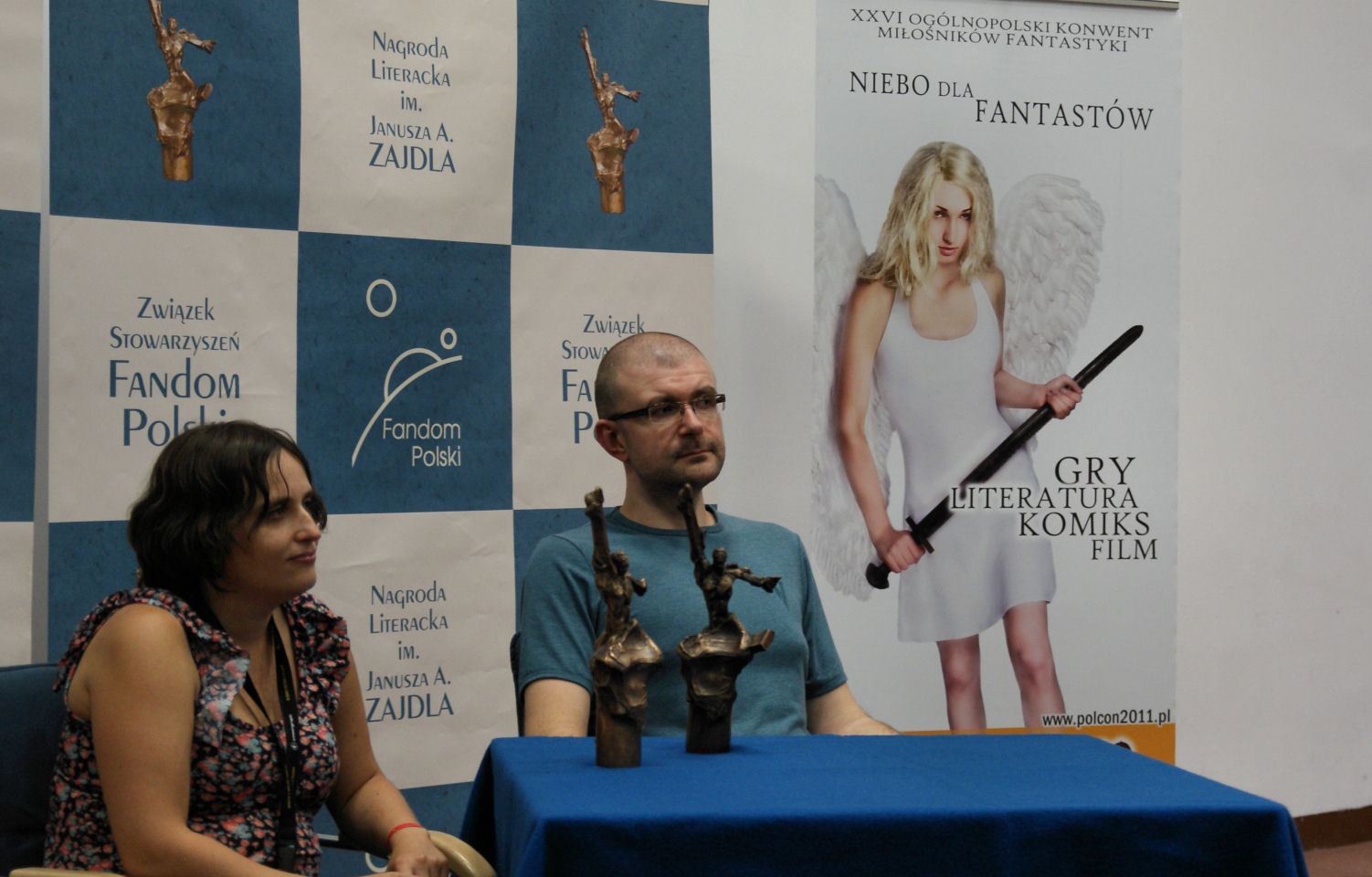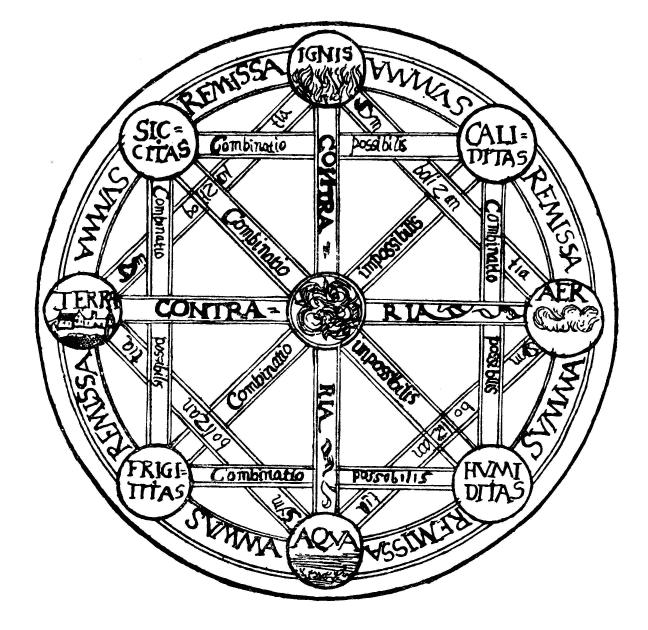|
Inne Pieśni
''Inne pieśni'' (''Other Songs'') is a novel written in 2003 by Jacek Dukaj, Polish science fiction writer. It was published in Poland by Wydawnictwo Literackie. The novel is a mixture of fantasy, alternate history and science fiction, and has been described as belonging to the genre of philosophical fiction as well. The novel was well received by reviewers and critics, who commented on its original theme - an alternate Earth where the laws of physics, and philosophy, are different from that of ours. The novel received the prime Polish award for sci-fi literature, Janusz A. Zajdel Award, in 2003. The book was translated to Russian (2014) and Bulgarian (2015). Universe The universe of the book is similar to ours with one major exception: instead of laws of physics as known to us, the universe is ruled by Aristotle's metaphysics, and to a lesser extent by Hegelian philosophy. There are no atoms or other particles, just five elements. All Matter is composed of those five e ... [...More Info...] [...Related Items...] OR: [Wikipedia] [Google] [Baidu] |
Jacek Dukaj
Jacek Józef Dukaj (pronounced: ; born 30 July 1974) is a Polish science fiction and fantasy writer. His fiction explores such themes as alternate history, alternative physics and logic, human nature, religion, the relationship between science and Power (social and political), power, technological singularity, artificial intelligence, and transhumanism. He is regarded among the most popular Polish contemporary science fiction authors. He is the recipient of numerous national and international literary prizes including the European Union Prize for Literature, Janusz A. Zajdel Award and Eurocon#European SF Awards, European Science Fiction Award. Career He was born on 30 July 1974 in Tarnów. He graduated from High School No. 3 in Tarnów and subsequently studied philosophy at the Jagiellonian University in Kraków. He made his literary debut at the age of 16 when he published his short story "" ("The Golden Galley") in the ''Fantastyka'' science-fiction monthly. In 1997, he pub ... [...More Info...] [...Related Items...] OR: [Wikipedia] [Google] [Baidu] |
Hegel
Georg Wilhelm Friedrich Hegel (27 August 1770 – 14 November 1831) was a 19th-century German idealism, German idealist. His influence extends across a wide range of topics from metaphysical issues in epistemology and ontology, to political philosophy and the aesthetics, philosophy of art and philosophy of religion, religion. Born in 1770 in Stuttgart, Holy Roman Empire, during the transitional period between the Age of Enlightenment#German states, Enlightenment and the German Romanticism, Romantic movement in the Germanic regions of Europe, Hegel lived through and was influenced by the French Revolution and the Napoleonic wars. His fame rests chiefly upon the ''The Phenomenology of Spirit, Phenomenology of Spirit'', the ''Science of Logic'', and his Teleology, teleological account of history. Throughout his career, Hegel strove to correct what he argued were untenable Mind–body dualism, dualisms endemic to modern philosophy (typically by drawing upon the resources of ancient ... [...More Info...] [...Related Items...] OR: [Wikipedia] [Google] [Baidu] |
Fall Of Rome
The fall of the Western Roman Empire, also called the fall of the Roman Empire or the fall of Rome, was the loss of central political control in the Western Roman Empire, a process in which the Empire failed to enforce its rule, and its vast territory was divided among several successor polities. The Roman Empire lost the strengths that had allowed it to exercise effective control over its Western provinces; modern historians posit factors including the effectiveness and numbers of the army, the health and numbers of the Roman population, the strength of the economy, the competence of the emperors, the internal struggles for power, the religious changes of the period, and the efficiency of the civil administration. Increasing pressure from invading peoples outside Roman culture also contributed greatly to the collapse. Climatic changes and both endemic and epidemic disease drove many of these immediate factors. The reasons for the collapse are major subjects of the historiog ... [...More Info...] [...Related Items...] OR: [Wikipedia] [Google] [Baidu] |
Hedonist
Hedonism is a family of philosophical views that prioritize pleasure. Psychological hedonism is the theory that all human behavior is motivated by the desire to maximize pleasure and minimize pain. As a form of egoism, it suggests that people only help others if they expect a personal benefit. Axiological hedonism is the view that pleasure is the sole source of intrinsic value. It asserts that other things, like knowledge and money, only have value insofar as they produce pleasure and reduce pain. This view divides into quantitative hedonism, which only considers the intensity and duration of pleasures, and qualitative hedonism, which identifies quality as another relevant factor. The closely related position of prudential hedonism states that pleasure and pain are the only factors of well-being. Ethical hedonism applies axiological hedonism to morality, arguing that people have a moral duty to pursue pleasure and avoid pain. Utilitarian versions assert that the goal is to in ... [...More Info...] [...Related Items...] OR: [Wikipedia] [Google] [Baidu] |
Despotism
In political science, despotism () is a government, form of government in which a single entity rules with absolute Power (social and political), power. Normally, that entity is an individual, the despot (as in an autocracy), but societies which limit respect and power to specific groups have also been called despotic. Colloquially, the word ''despot'' applies pejoratively to those who use their power and authority to oppress their populace or subordinates. More specifically, the term often applies to a head of state or Head of government, government. In this sense, it is similar to the pejorative connotations that are associated with the terms ''tyrant'' and ''dictator''. Despot (court title), ''Despot'' has also been a Imperial, royal and noble ranks, royal title assumed by various leaders historically. Etymology The root ''despot'' comes from the Greek language, Greek word ''despotes'', which means "one with power." In ancient Greek usage, a ''despótès'' was technicall ... [...More Info...] [...Related Items...] OR: [Wikipedia] [Google] [Baidu] |
Human Mind
The mind is that which thinks, feels, perceives, imagines, remembers, and wills. It covers the totality of mental phenomena, including both conscious processes, through which an individual is aware of external and internal circumstances, and unconscious processes, which can influence an individual without intention or awareness. The mind plays a central role in most aspects of human life, but its exact nature is disputed. Some characterizations focus on internal aspects, saying that the mind transforms information and is not directly accessible to outside observers. Others stress its relation to outward conduct, understanding mental phenomena as dispositions to engage in observable behavior. The mind–body problem is the challenge of explaining the relation between matter and mind. Traditionally, mind and matter were often thought of as distinct substances that could exist independently from one another. The dominant philosophical position since the 20th century has b ... [...More Info...] [...Related Items...] OR: [Wikipedia] [Google] [Baidu] |
Will (philosophy)
Will, within philosophy, is a faculty of the mind. Will is important as one of the parts of the mind, along with reason and understanding. It is considered central to the field of ethics because of its role in enabling deliberate action. A recurring question in Western philosophical tradition is about free willand the related, but more general notion of fatewhich asks how the will can truly be free if a person's actions have either natural or divine causes determining them. In turn, this is directly connected to discussions on the nature of freedom and to the problem of evil. Classical philosophy The classical treatment of the ethical importance of will is to be found in the ''Nicomachean Ethics'' of Aristotle, in Books III (chapters 1–5), and Book VII (chapters 1–10). These discussions have been a major influence in the development of ethical and legal thinking in Western civilization. In Book III Aristotle divided actions into three categories instead of two: * Volunta ... [...More Info...] [...Related Items...] OR: [Wikipedia] [Google] [Baidu] |
Aether (classical Element)
According to ancient and History of science in the Middle Ages, medieval science, aether (, alternative spellings include ''æther'', ''aither'', and ''ether''), also known as the fifth element or quintessence, is the material that fills the region of the universe beyond the Sublunary sphere, terrestrial sphere. The concept of aether was used in several theories to explain several natural phenomena, such as the propagation of light and gravity. In the late 19th century, physicists postulated that aether permeated space, providing a medium through which light could travel in a vacuum, but evidence for the presence of such a medium was not found in the Michelson–Morley experiment, and this result has been interpreted to mean that no luminiferous aether exists. Mythological origins The word (''aithḗr'') in Homeric Greek means "pure, fresh air" or "clear sky". In Greek mythology, it was thought to be the pure essence that the gods breathed, filling the space where they lived, an ... [...More Info...] [...Related Items...] OR: [Wikipedia] [Google] [Baidu] |
Vacuum
A vacuum (: vacuums or vacua) is space devoid of matter. The word is derived from the Latin adjective (neuter ) meaning "vacant" or "void". An approximation to such vacuum is a region with a gaseous pressure much less than atmospheric pressure. Physicists often discuss ideal test results that would occur in a ''perfect'' vacuum, which they sometimes simply call "vacuum" or free space, and use the term partial vacuum to refer to an actual imperfect vacuum as one might have in a laboratory or in space. In engineering and applied physics on the other hand, vacuum refers to any space in which the pressure is considerably lower than atmospheric pressure. The Latin term ''in vacuo'' is used to describe an object that is surrounded by a vacuum. The ''quality'' of a partial vacuum refers to how closely it approaches a perfect vacuum. Other things equal, lower gas pressure means higher-quality vacuum. For example, a typical vacuum cleaner produces enough suction to reduce air pressur ... [...More Info...] [...Related Items...] OR: [Wikipedia] [Google] [Baidu] |
Teleological
Teleology (from , and )Partridge, Eric. 1977''Origins: A Short Etymological Dictionary of Modern English'' London: Routledge, p. 4187. or finalityDubray, Charles. 2020 [1912].Teleology. In ''The Catholic Encyclopedia'' 14. New York: Robert Appleton Company. Retrieved 3 May 2020. – via ''New Advent'', transcribed by D. J. Potter is a branch of causality giving the reason or an explanation for something as a function of its end, its purpose, or its goal, as opposed to as a function of its cause. James Wood (encyclopaedist), James Wood, in his ''The Nuttall Encyclopædia, Nuttall Encyclopaedia'', explained the meaning of ''teleology'' as "the doctrine of final causes, particularly the argument for the being and character of God from the being and character of His works; that the end reveals His purpose from the beginning, the end being regarded as the thought of God at the beginning, or the universe viewed as the realisation of Him and His eternal purpose." A purpose that is impose ... [...More Info...] [...Related Items...] OR: [Wikipedia] [Google] [Baidu] |
Evolution
Evolution is the change in the heritable Phenotypic trait, characteristics of biological populations over successive generations. It occurs when evolutionary processes such as natural selection and genetic drift act on genetic variation, resulting in certain characteristics becoming more or less common within a population over successive generations. The process of evolution has given rise to biodiversity at every level of biological organisation. The scientific theory of evolution by natural selection was conceived independently by two British naturalists, Charles Darwin and Alfred Russel Wallace, in the mid-19th century as an explanation for why organisms are adapted to their physical and biological environments. The theory was first set out in detail in Darwin's book ''On the Origin of Species''. Evolution by natural selection is established by observable facts about living organisms: (1) more offspring are often produced than can possibly survive; (2) phenotypic variatio ... [...More Info...] [...Related Items...] OR: [Wikipedia] [Google] [Baidu] |
Classical Elements
The classical elements typically refer to earth, water, air, fire, and (later) aether which were proposed to explain the nature and complexity of all matter in terms of simpler substances. Ancient cultures in Greece, Angola, Tibet, India, and Mali had similar lists which sometimes referred, in local languages, to "air" as "wind", and to "aether" as "space". These different cultures and even individual philosophers had widely varying explanations concerning their attributes and how they related to observable phenomena as well as cosmology. Sometimes these theories overlapped with mythology and were personified in deities. Some of these interpretations included atomism (the idea of very small, indivisible portions of matter), but other interpretations considered the elements to be divisible into infinitely small pieces without changing their nature. While the classification of the material world in ancient India, Hellenistic Egypt, and ancient Greece into air, earth, fir ... [...More Info...] [...Related Items...] OR: [Wikipedia] [Google] [Baidu] |









